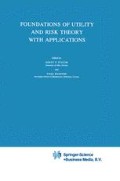Abstract
Classical game theory used only objective probabilities (for characterizing random moves and mixed strategies). Subjective probabilities were first introduced in modelling Cames with incomplete information. More recently, Reinhard Selten and the present writer have used subjective probabilities in our solution theory for noncooperative games. The paper will discuss some of the methodological problems associated with this work. It will also comment on the economic meaning of von Neumann-Morgenstern utility functions.
Access this chapter
Tax calculation will be finalised at checkout
Purchases are for personal use only
Preview
Unable to display preview. Download preview PDF.
References
Anscombe, F.J. and R.J. Aumann: 1963, ‘A Definition of Subjective Probability’, Annals of Mathematical Statistics 34, 199–205.
de Finetti, B.: 1937, ‘La prévision: ses lois logiques, ses sources subjectives’, Annals de l’Institut Henri Poincaré 7, 1–68.
Engelbrecht-Wiggans, R.: 1980, ‘Auctions and Bidding: A Survey’, Management Science 26, 119–142.
Harsanyi, J.C.: 1967–68, ‘Games with Incomplete Information Played by “Bayesian” Players’, Parts I-III,Management Science 14, 159–182, 320–334 and 486–502.
Harsanyi, J.C.: 1975, ‘The Tracing Procedure’, International Journal of Game Theory 4, 61–94.
Harsanyi, J.C.: 1977, Rational Behavior and Bargaining Equilibrium in Games and Social Situations, Cambridge University Press, Cambridge, England.
Harsanyi, J.C.: 1978, ‘Bayesian Decision Theory and Utilitarian Ethics’, American Economic Review 68, 223–228.
Harsanyi, J.C.: 1981, ‘Solution for Some Bargaining Games Under the Harsanyi-Selten Solution Theory’, Parts I-II, Working Papers CP-431 and 432, Center for Research in Management, University of California, Berkeley, California 94720, U.S.A.
Luce, R.D. and H. Raiffa: 1957, Games and Decisions, Wiley, New York.
Nash, J.F.: 1951, ‘Non-cooerative Games’, Annals of Mathematics 54, 286–295.
Ramsey, F.P.: 1931, The Foundations of Mathematics and Other Logical Essays, Kegan Paul, London.
Savage, L.J.: 1954, The Foundations of Statistics, Wiley, New York.
Selten, R.: 1975, ‘Reexamination of the Perfectness Concept for Equilibrium Points in Extensive Games’, International Journal of Game Theory 4, 25–55.
von Neumann, J. and O. Morgenstern: first edition 1944, second edition 1947, Theory of Games and Economic Behavior, Princeton University Press, Princeton; N.J..
Author information
Authors and Affiliations
Editor information
Editors and Affiliations
Rights and permissions
Copyright information
© 1983 Springer Science+Business Media Dordrecht
About this chapter
Cite this chapter
Harsanyi, J.C. (1983). Use of Subjective Probabilities in Game Theory. In: Stigum, B.P., Wenstøp, F. (eds) Foundations of Utility and Risk Theory with Applications. Theory and Decision Library, vol 37. Springer, Dordrecht. https://doi.org/10.1007/978-94-017-1590-4_16
Download citation
DOI: https://doi.org/10.1007/978-94-017-1590-4_16
Publisher Name: Springer, Dordrecht
Print ISBN: 978-90-481-8364-7
Online ISBN: 978-94-017-1590-4
eBook Packages: Springer Book Archive

